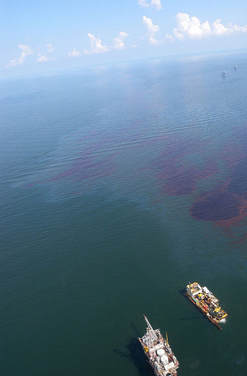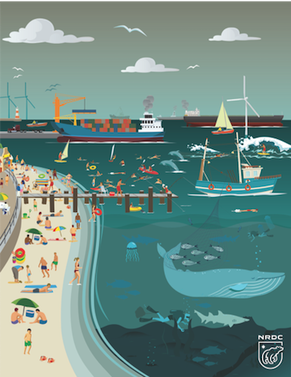The American Littoral Society believes that real people, towns, and communities have the power to leave a positive, lasting legacy by acting at the local level and leading the way on conservation of the ocean and coast.
Ocean use is expanding at a rapid pace, increasing our consumption of natural resources and the demand we place on our ocean and coastal ecosystem. In early 2018, the federal administration released a proposal to open more than 90 percent of our coastlines to oil and gas exploration and drilling, shipping traffic is expanding, ocean sand mining is increasing, and plans for large offshore wind energy projects are underway.
At the American Littoral Society conservation of marine life and habitat, protecting the coast from harm, and empowering others to do the same is fundamental to our mission. We believe that local leadership is imperative to maintaining the health of the environment and economy. We look to government agencies in the Mid-Atlantic to make responsible decisions about our ocean and coasts, knowing that their decisions will impact coastal resiliency, ocean health, and the livelihoods of coastal communities for decades to come.
This is our inspiration for the “Champions of the Coast” program–to show that real people, towns, and communities have the power to leave a positive, lasting legacy. Our growing list of Coastal Champions act at the local level and lead the way on conservation of the ocean and coasts by supporting regional ocean planning to protect special marine places, opposing new offshore oil and gas drilling; and banning intentional balloon releases that pollute our beaches and waters. Here’s how to become a coastal champion:
At the American Littoral Society conservation of marine life and habitat, protecting the coast from harm, and empowering others to do the same is fundamental to our mission. We believe that local leadership is imperative to maintaining the health of the environment and economy. We look to government agencies in the Mid-Atlantic to make responsible decisions about our ocean and coasts, knowing that their decisions will impact coastal resiliency, ocean health, and the livelihoods of coastal communities for decades to come.
This is our inspiration for the “Champions of the Coast” program–to show that real people, towns, and communities have the power to leave a positive, lasting legacy. Our growing list of Coastal Champions act at the local level and lead the way on conservation of the ocean and coasts by supporting regional ocean planning to protect special marine places, opposing new offshore oil and gas drilling; and banning intentional balloon releases that pollute our beaches and waters. Here’s how to become a coastal champion:
How to become a champion of the coast:
ADOPT A RESOLUTION OPPOSING NEW OFFSHORE OIL AND GAS DRILLING |
ADOPT A RESOLUTION IN SUPPORT OF REGIONAL OCEAN PLANNING
|
Pass an ordinance banning the intentional release of balloons |
Pass a resolution in support of ocean planning
The Mid-Atlantic is home to a rich variety of fish and wildlife—from blue crabs to endangered North Atlantic right whales. The increasing use of our ocean calls for more strategic and sustainable planning and management to ensure we protect what we love about and need from those waters. Regional ocean planning provides decision-makers and citizens with the tools they need to get involved in the protection and management of our coasts, ocean, and bays.
Just as towns develop plans for how to use shared space, ocean planning provides a process to do the same across our shared waters. The Mid-Atlantic regional ocean planning process provides coastal communities and organizations interested in ocean and coastal issues—including beach goers and surfers, recreational and commercial fishing communities, businesses and conservationists—a platform for voicing their needs and concerns about ensuring healthy ocean ecosystems and sustainable ocean uses. Such planning will not only help us protect the ocean environment, but support a blue economy, and improve coordination between state and federal agencies.
The Society’s Ocean Policy Program encourages Mid-Atlantic coastal communities to support smart ocean planning by working with them to pass resolutions that identify what they deem important to their community and how they want it protected.
Just as towns develop plans for how to use shared space, ocean planning provides a process to do the same across our shared waters. The Mid-Atlantic regional ocean planning process provides coastal communities and organizations interested in ocean and coastal issues—including beach goers and surfers, recreational and commercial fishing communities, businesses and conservationists—a platform for voicing their needs and concerns about ensuring healthy ocean ecosystems and sustainable ocean uses. Such planning will not only help us protect the ocean environment, but support a blue economy, and improve coordination between state and federal agencies.
The Society’s Ocean Policy Program encourages Mid-Atlantic coastal communities to support smart ocean planning by working with them to pass resolutions that identify what they deem important to their community and how they want it protected.
Pass a resolution opposing offshore oil and gas
On January 4, 2018, the Department of the Interior released a Draft Proposed Plan for new offshore oil and gas leases. This radical proposal recommends putting more than 90 percent of our offshore waters up for lease to the oil and gas industry. This level of exploration and extraction places the entire U.S. coastline—and the multi-billion-dollar coastal economies they support, such as recreation, tourism, and fishing—at risk.
Local and state leaders around the country immediately acted, understanding that this proposal poses a tremendous threat to our ocean, coasts, and economic and national security. These leaders teamed up with communities and spoke out in solidarity to protect our environment and coastal economies all around the country.
According to our partner Oceana, as of August 2018, more than 300 municipalities and over 1,900 elected local, state and federal officials have formally opposed offshore drilling and seismic airgun blasting, including at least 220 along the Atlantic and Gulf Coast, and the Governors of New Jersey, Delaware, Maryland, Virginia, North Carolina and South Carolina.
In New Jersey, where the Society is headquartered, elected officials are standing strong in opposition to the proposed plan. The Society is supporting dozens of municipalities, county governments, and chambers of commerce as those entities pass resolutions in opposition to opening our waters for oil and gas development. The Society will support more champions as they come forward.
Local and state leaders around the country immediately acted, understanding that this proposal poses a tremendous threat to our ocean, coasts, and economic and national security. These leaders teamed up with communities and spoke out in solidarity to protect our environment and coastal economies all around the country.
According to our partner Oceana, as of August 2018, more than 300 municipalities and over 1,900 elected local, state and federal officials have formally opposed offshore drilling and seismic airgun blasting, including at least 220 along the Atlantic and Gulf Coast, and the Governors of New Jersey, Delaware, Maryland, Virginia, North Carolina and South Carolina.
In New Jersey, where the Society is headquartered, elected officials are standing strong in opposition to the proposed plan. The Society is supporting dozens of municipalities, county governments, and chambers of commerce as those entities pass resolutions in opposition to opening our waters for oil and gas development. The Society will support more champions as they come forward.
Pass an ordinance banning the intentional release of balloons
What goes up must come down. Balloons released into the sky eventually come back down, where they can cause big problems for wildlife.
When balloons fall back to Earth they frequently enter our waterways, where they pose an often-enticing danger to any wildlife that encounters them. Sea turtles and birds often mistake balloons as food and can also become entangled in the attached ribbons. When animals swallow balloons they can block their intestinal tract and lead to starvation.
Awareness is growing about how balloons can harm marine life and celebrations that historically included massive balloon releases are coming to an end. The United States Fish and Wildlife Service launched an education initiative about the dangers of balloons to wildlife and coastal cleanups have been documenting balloons as a major source of pollution for years. The National Oceanic and Atmospheric Administration reports that between 2010-2014, 4,916 pieces of balloon litter were found in Virginia by volunteers participating in the International Coastal Cleanup – more than 3,000 of those pieces were found on beaches. Recent surveys of remote islands on Virginia’s Eastern Shore documented up to 40 balloons per mile of beach.
Intentional balloon release bans have been passed into law by California, Connecticut, Florida, Tennessee, and Virginia as well as many cities in the U.S. Local efforts in New Jersey are growing and we support our communities making a difference and encourage others to join in!
When balloons fall back to Earth they frequently enter our waterways, where they pose an often-enticing danger to any wildlife that encounters them. Sea turtles and birds often mistake balloons as food and can also become entangled in the attached ribbons. When animals swallow balloons they can block their intestinal tract and lead to starvation.
Awareness is growing about how balloons can harm marine life and celebrations that historically included massive balloon releases are coming to an end. The United States Fish and Wildlife Service launched an education initiative about the dangers of balloons to wildlife and coastal cleanups have been documenting balloons as a major source of pollution for years. The National Oceanic and Atmospheric Administration reports that between 2010-2014, 4,916 pieces of balloon litter were found in Virginia by volunteers participating in the International Coastal Cleanup – more than 3,000 of those pieces were found on beaches. Recent surveys of remote islands on Virginia’s Eastern Shore documented up to 40 balloons per mile of beach.
Intentional balloon release bans have been passed into law by California, Connecticut, Florida, Tennessee, and Virginia as well as many cities in the U.S. Local efforts in New Jersey are growing and we support our communities making a difference and encourage others to join in!
IS YOUR COMMUNITY THE NEXT CHAMPION OF THE COAST?
Use the sample resolutions and ordinance provided on this resource page to take municipal actions or contact Helen Henderson, Ocean Program Manager, to find out more about your community becoming a “Champion of the Coast”.
Please be sure to contact the Society once all coastal champion actions are completed so we can provide your certificate of recognition and list you on our webpage. Thank you for all you do to protect our ocean and coast!
Please be sure to contact the Society once all coastal champion actions are completed so we can provide your certificate of recognition and list you on our webpage. Thank you for all you do to protect our ocean and coast!
CONGRATULATIONS TO OUR CHAMPIONS OF THE COAST!
New Jersey:
Asbury Park, Monmouth County
Berkeley Township, Ocean County
Bradley Beach, Monmouth County
Lavallette, Ocean County
Long Beach Township, Ocean County
Ocean Gate, Ocean County
Point Pleasant Beach, Ocean County
Asbury Park, Monmouth County
Berkeley Township, Ocean County
Bradley Beach, Monmouth County
Lavallette, Ocean County
Long Beach Township, Ocean County
Ocean Gate, Ocean County
Point Pleasant Beach, Ocean County




